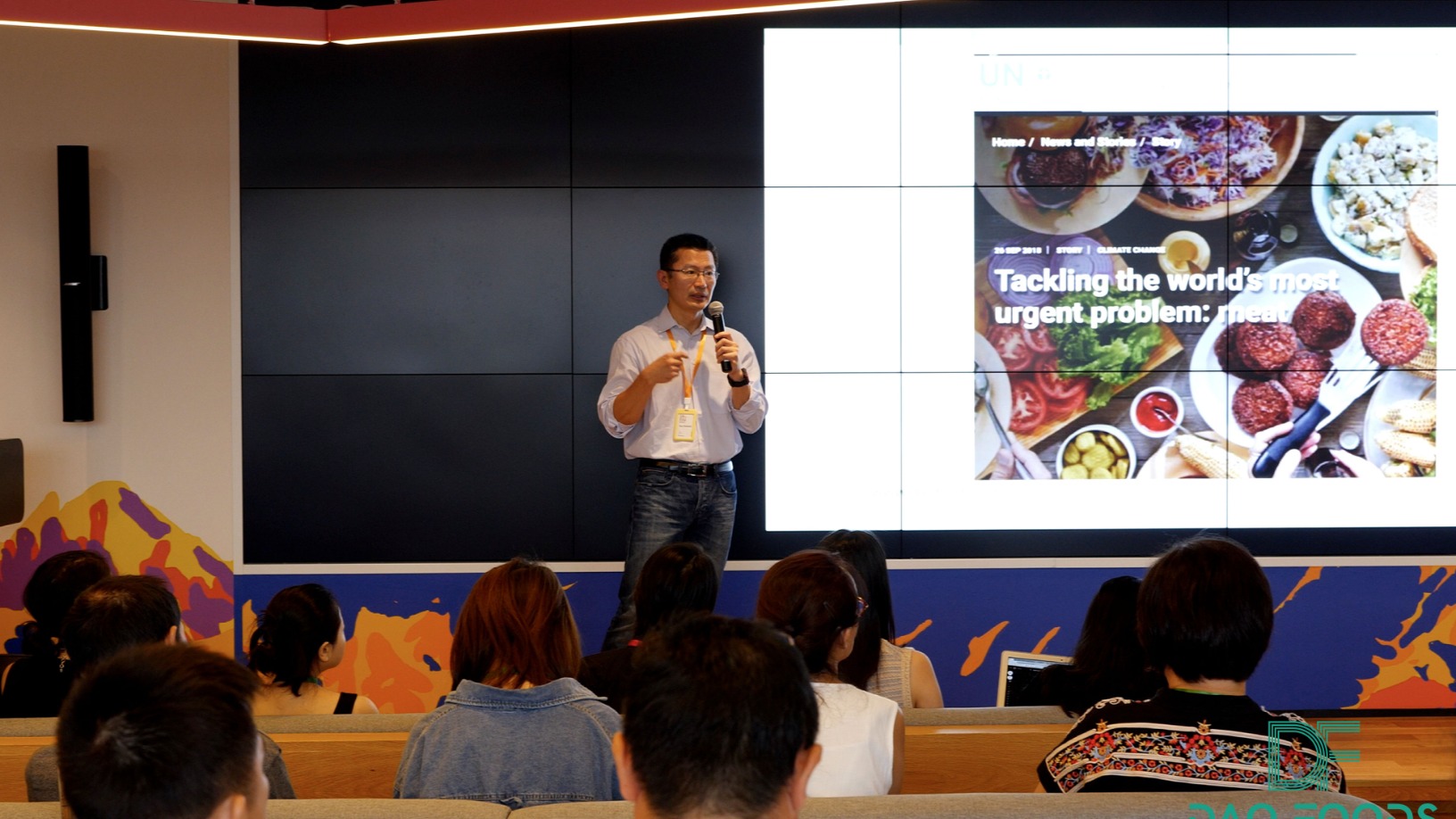As China’s internet companies come under increased state scrutiny and some investors begin switching to less risky sectors, Zhang Tao, the co-founder of Chinese alternative protein investor Dao Foods International, remains optimistic about the sector he backs because it is well aligned with the government’s goals.
Last year, China announced its target to achieve protein self-sufficiency by 2050, something Zhang welcomes as “making sense” from a food security perspective.
“Once the government recognizes the positive influence alternative protein can bring to the environment and society, the sector is likely to get policy support in the future,” Zhang told CompassList in a recent interview.
Also an incubator, Dao Foods – whose mission is to nurture businesses to provide the Chinese, the world’s largest meat consumers, with “next-generation good food” – recently unveiled the five companies selected to the second cohort of its incubation program.
From its first cohort last year, four startups have completed their six-month incubation and are likely to announce funding deals shortly, Zhang said. Dao Foods’s plan is to support and invest in 30 China-focused alternative protein ventures in a three-year period from 2020.
When Dao Foods launched its incubator last year, the concept of plant-based protein was just picking up steam in China. Some entrepreneurs had not thought about venturing into the plant-based protein space, Zhang said. "What we did was to guide them into the new area."
Consumer focus is key
Compared with the first cohort, which was focused on plant-based protein, the second is more diversified. More B2B companies and other types of alternative protein startups have been included in the new batch, but the key criteria for screening remain unchanged.
"We have a preference [for certain types of companies] while picking startups for each cohort, depending on how the alternative protein space is evolving,” Zhang said. “However, all the selected startups must place their priority on products and must also have strong technological capabilities.”
“Even while targeting business clients, they still need to assist their customers to create products desired by consumers,” he added.
The startups forming Dao Foods Incubator’s second cohort are:

- ShiShen Food Technology, which integrates traditional Chinese medicine into plant-based foods;
- Shanghai Protein, which upcycles byproducts from food processing into protein powder;
- Geb Impact Technology, which cultivates and ferments microalgae for alternative protein,
- Blue Canopy, which produces protein from mycelium fermentation; and
- US-based cell-based seafood company Cultured Decadence.
Cultured Decadence, which is working on cell-based lobster, is the first cross-border startup selected by Dao Foods. According to Zhang, compared with cell-based beef or pork, lobster is a more suitable choice to crack the markets in China and Asia at large. “It’s already a high-end item, making the cell-based version more easily acceptable to consumers,” he said.
The company from Madison, Wisconsin, was also compelling for another reason. “The startup plans on seeking collaboration with Chinese researchers or academic institutions for R&D and other operations, which will positively influence the China market," Zhang said, adding that its technologies and business model can be an inspiration to Chinese companies.
Products in market
As much as 80% of the mentoring and support Dao Foods gives is tailored to the specific needs of each incubatee, and capitalizes on the investor’s global network of mentors and partners. “The [companies in the first cohort] are making improvements in their business models and product/market fit,” Zhang said.
All four companies incubated in the first batch already have products in the market, which they continue to tweak to better serve consumers. For example, WOW Foods, which makes plant-based functional protein drinks for children, introduced its pea-based drinks this summer – the first in China – while plant-based yogurt producer Fresh Foods developed a taste that’s totally different from animal-based yogurt with its TruePlants brand. Ready-to-eat/cook meals provider Kitchen 70/30 will use fermentation techniques to develop its second-generation products.

“Such disruptive products and technology will be a key driving force to make a big change or even introduce the tipping point of mass adoption [of alternative protein],” Zhang said. “Think about iPhone’s success. It’s a disruptive invention, not an imitation of even the best phones available then.”
One of Dao Foods’s earliest investments, Starfield, a Shenzhen-based foodtech company founded in 2019, already has a presence in over 12,000 restaurants across the country with its wide-ranging plant-based products, from hamburgers to dumplings.
Starfield attended and benefited from Dao Foods’s first China Next-Gen Good Food Bootcamp in 2019. Dao Foods held another Bootcamp in Beijing in 2019 where Starfield was also showcased and two Bootcamps in Shanghai and Shenzhen in 2020. In July, it held its fifth Bootcamp in Shanghai.
Ready for the long haul
Despite the fast-growing acceptance plant-based protein gained in China last year, it also faced some backlash from consumers. A video clip on social media showing a famous young actress promoting plant-based meat dumplings sparked an online debate about the affordability and nutrition of plant-based meat. Netizens even went as far as suggesting that foreign companies, which own the core technologies and patents, will exploit Chinese consumers.
“The mainstream consumer knowledge and adoption of new protein products are far from there yet, and there are no shortcuts,” Zhang said. Celebrities may help generate buzz quickly, but that won’t last if they don’t really believe in the food they promote, he said, commenting on the actress in the controversy who actually doesn’t take plant-based proteins in real life.
Companies therefore should be very cautious when marketing their offerings. "Only the right products can win over the consumers in China, and it takes time,” he added.
It’s a long game for investors as well. Fewer alternative protein funding deals were announced this year compared with 2020. “Because of the backlash, investors became more rational, especially those who are not familiar with the space and just want to follow the trend,” Zhang said.
“Although momentum has been building up in this sector over the past two years, the alternative protein sector is still quite nascent in China,” Zhang said. “It [building or investing in alternative proteins] is not sprinting. Only the long-distance runners have a chance of winning.
"The game changers will be the entrepreneurs who know how to conquer the stomachs and minds of China's mainstream consumers. We hope to prepare an army of such entrepreneurs to achieve the positive environmental and climate impact in and from China."











